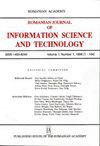使用人工智能算法研究:说脏话会增加易怒
IF 3.9
4区 计算机科学
Q1 COMPUTER SCIENCE, THEORY & METHODS
Romanian Journal of Information Science and Technology
Pub Date : 2023-09-28
DOI:10.59277/romjist.2023.3-4.09
引用次数: 0
摘要
本文从易怒的角度对频繁使用脏话所产生的影响进行了分析。通过对两组被诱导负性情绪的志愿者的语音信号进行卷积神经网络(Convolutional Neural Networks, CNN)实现的自动识别功能,并在诱导负性情绪前后分别对志愿者完成两份心理问卷进行分析。CNN架构使用从语音信号中获得的Mel-frequency倒谱系数(MFCCs),具有87,944个可训练参数,网络的输出是算法检测到的8类主要情绪(1类中性,3类积极,4类消极)。CNN还提供了有关负面情绪和易怒程度的信息。在实验中说过脏话的志愿者的负面情绪强度比没有说过脏话的志愿者增加了14%,易怒程度增加了21%。目前这项研究的用途是理解诅咒会导致更高程度的易怒。本文章由计算机程序翻译,如有差异,请以英文原文为准。
Using Swear Words Increases the Irritability – a Study Using AI Algorithms
This paper presents the effects’ analysis produced by the frequent use of swearing from the perspective of irritability. The analysis was carried out with the help of two psychological questionnaires that were completed by the volunteers before and after the inducement of the negative emotions and automatic recognition functions implemented by Convolutional Neural Networks (CNN), applied for the speech signals of two volunteer groups for whom negative emotions were induced. The CNN architecture uses Mel-frequency cepstral coefficients (MFCCs), obtained from the speech signal, and has 87,944 trainable parameters, the outputs of the network being the 8 main classes of emotion detected by the algorithm (1 neutral, 3 positive, and 4 negative). The CNN also gives information about the negative emotion and irritability level. For the volunteers who swore during the experiment, there is an increase of 14% in negative emotion intensity and of 21% for the irritability level than for the volunteers who didn’t swear during the trials. The use of this current research is the understanding that cursing causes a higher level of irritability.
求助全文
通过发布文献求助,成功后即可免费获取论文全文。
去求助
来源期刊

Romanian Journal of Information Science and Technology
工程技术-计算机:理论方法
CiteScore
5.50
自引率
8.60%
发文量
0
审稿时长
>12 weeks
期刊介绍:
The primary objective of this journal is the publication of original results of research in information science and technology. There is no restriction on the addressed topics, the only acceptance criterion being the originality and quality of the articles, proved by independent reviewers. Contributions to recently emerging areas are encouraged.
Romanian Journal of Information Science and Technology (a publication of the Romanian Academy) is indexed and abstracted in the following Thomson Reuters products and information services:
• Science Citation Index Expanded (also known as SciSearch®),
• Journal Citation Reports/Science Edition.
 求助内容:
求助内容: 应助结果提醒方式:
应助结果提醒方式:


